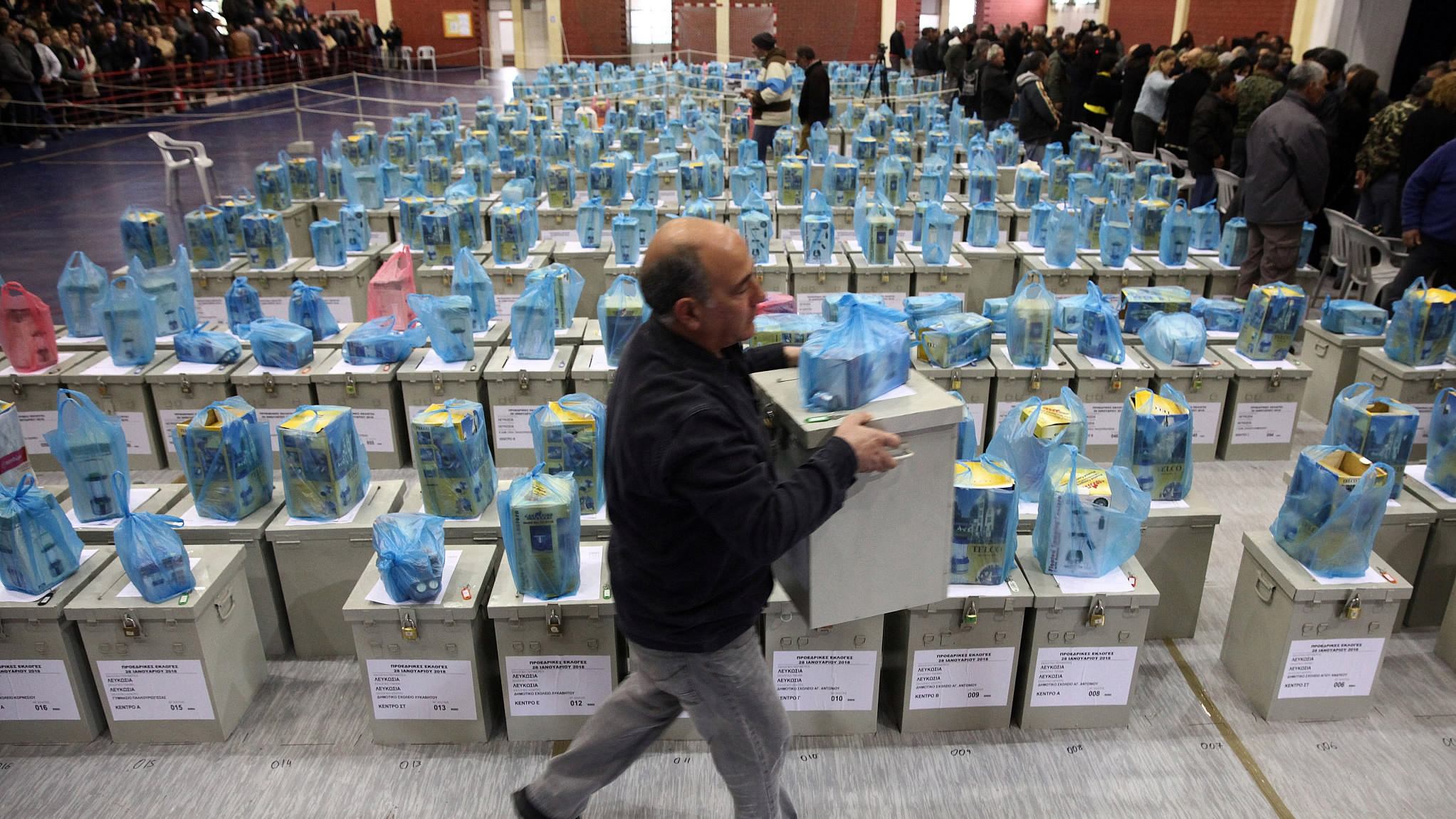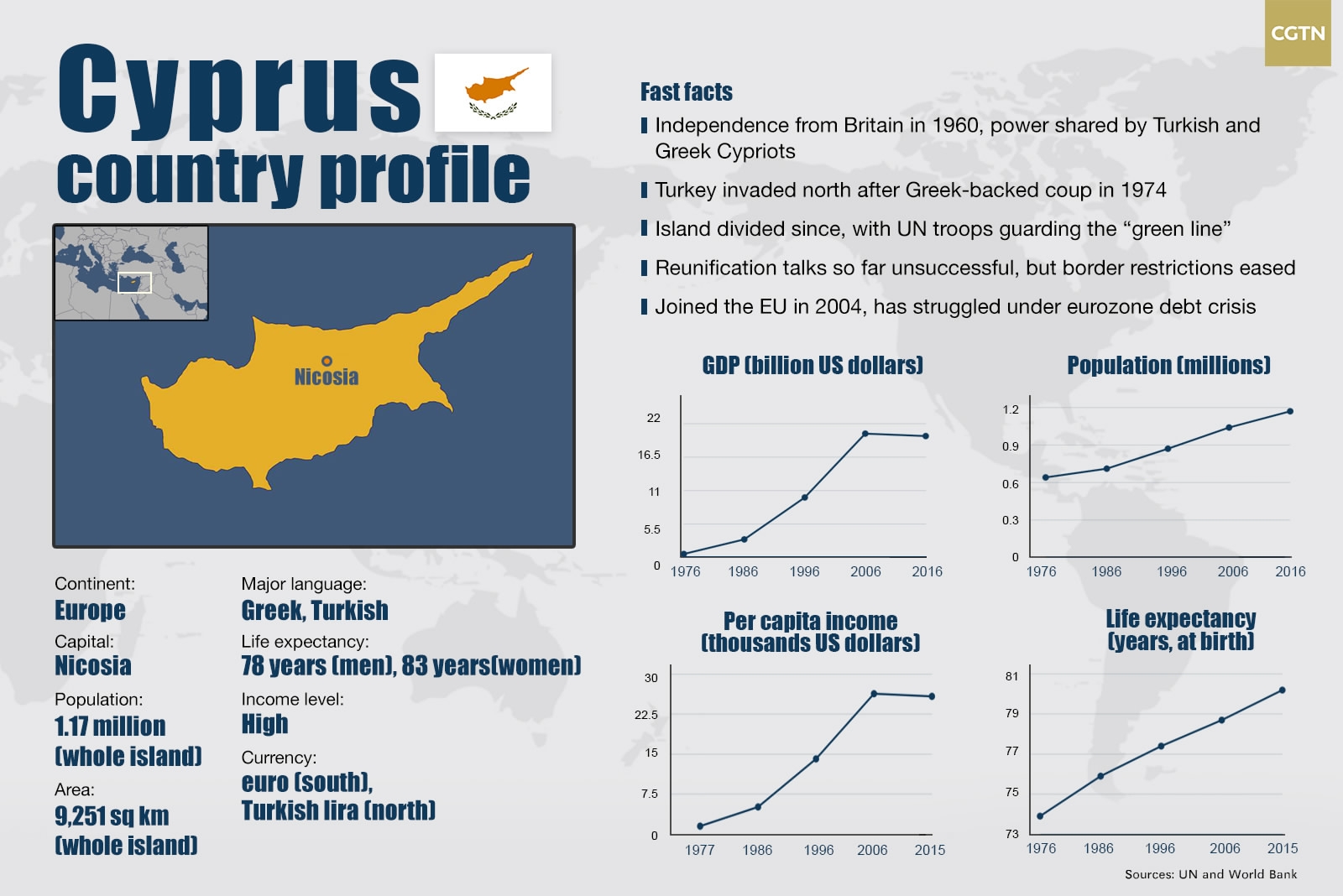Voters in Cyprus go to the polls on Sunday with three candidates in serious contention to take the presidency and reunification of the divided island a lingering backdrop.
An estimated 500,000 Cypriots will vote in a south buoyed by a fast-growing economy and falling unemployment – but deadlock persists over peace talks with the north.
Why is Cyprus divided?
Cyprus gained independence from Britain in 1960, and a combination of Greek and Turkish Cypriots then entered into a power-sharing agreement. In 1974, Turkish troops took over the north of the island in response to a coup by supporters of union with Greece.
The island has been divided since, with UN troops patrolling a buffer zone between the internationally-recognized south and a north which is recognized only by Turkey. Around 35,000 Turkish troops are still stationed in northern Cyprus.
The issue has wide regional significance, especially given the poor relations between the EU – of which Cyprus is a member – and Turkey, which has long sought membership of the bloc.
The next steps towards a viable solution are the backdrop to the presidential election.
What could a deal look like?
Attempts to find a solution have repeatedly been thwarted, notably in a 2004 referendum that could have led to a federation of two states called the United Republic of Cyprus.
Turkish Cypriots voted in favor of the UN-backed “Annan Plan” but Greek Cypriots vote against. Political leaders on both sides – including Tassos Papadopoulos, father of 2018 presidential candidate Nicolas – campaigned against the proposal.
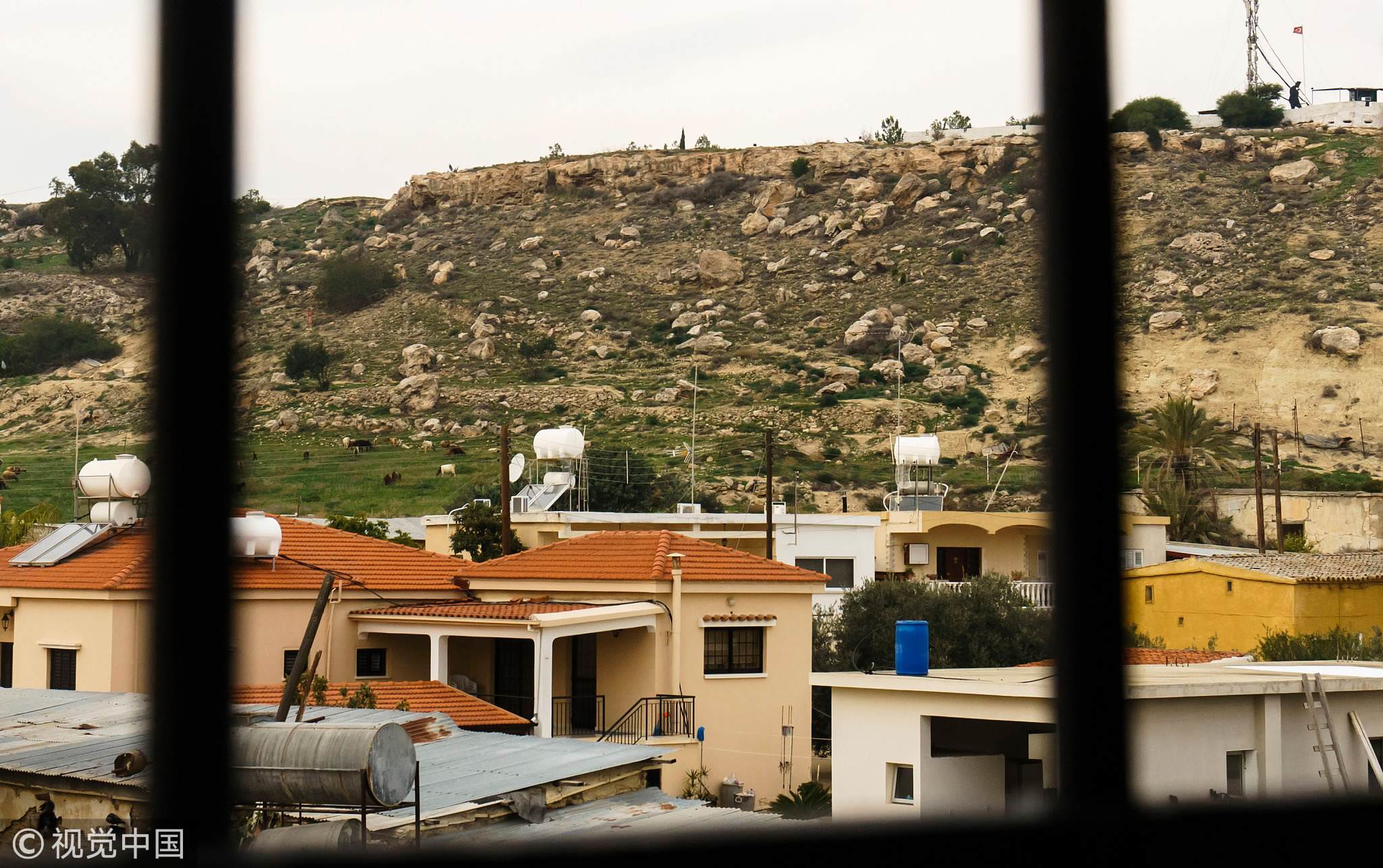
A Turkish military outpost (top R) is seen on January 10, 2018 in the bi-communal village of Pyla, which lies in the buffer zone. /VCG Photo
A Turkish military outpost (top R) is seen on January 10, 2018 in the bi-communal village of Pyla, which lies in the buffer zone. /VCG Photo
More recently, Mustafa Akinci, the Turkish Cypriot leader, and incumbent President Nicos Anastasiades worked for two years to reunite the island as a “bizonal, bicommunal federation.” Discussions culminated in UN-backed negotiations in Switzerland, but the talks ended in July 2017 with security concerns unresolved.
A majority of Turkish Cypriots voted in parliamentary elections for nationalist parties in early January, though a coalition is yet to be formed. Akinci remains in favor of reunification talks.
The UN has signaled a willingness to mediate talks again if a solution looks possible post-election.
Who are the candidates?
Nine candidates, all male, registered to contest Sunday’s presidential election, with polling suggesting center-right incumbent Anastasiades will compete against left-wing candidate Stavros Malas or centrist Nicolas Papadopoulos in a February 4 run-off.
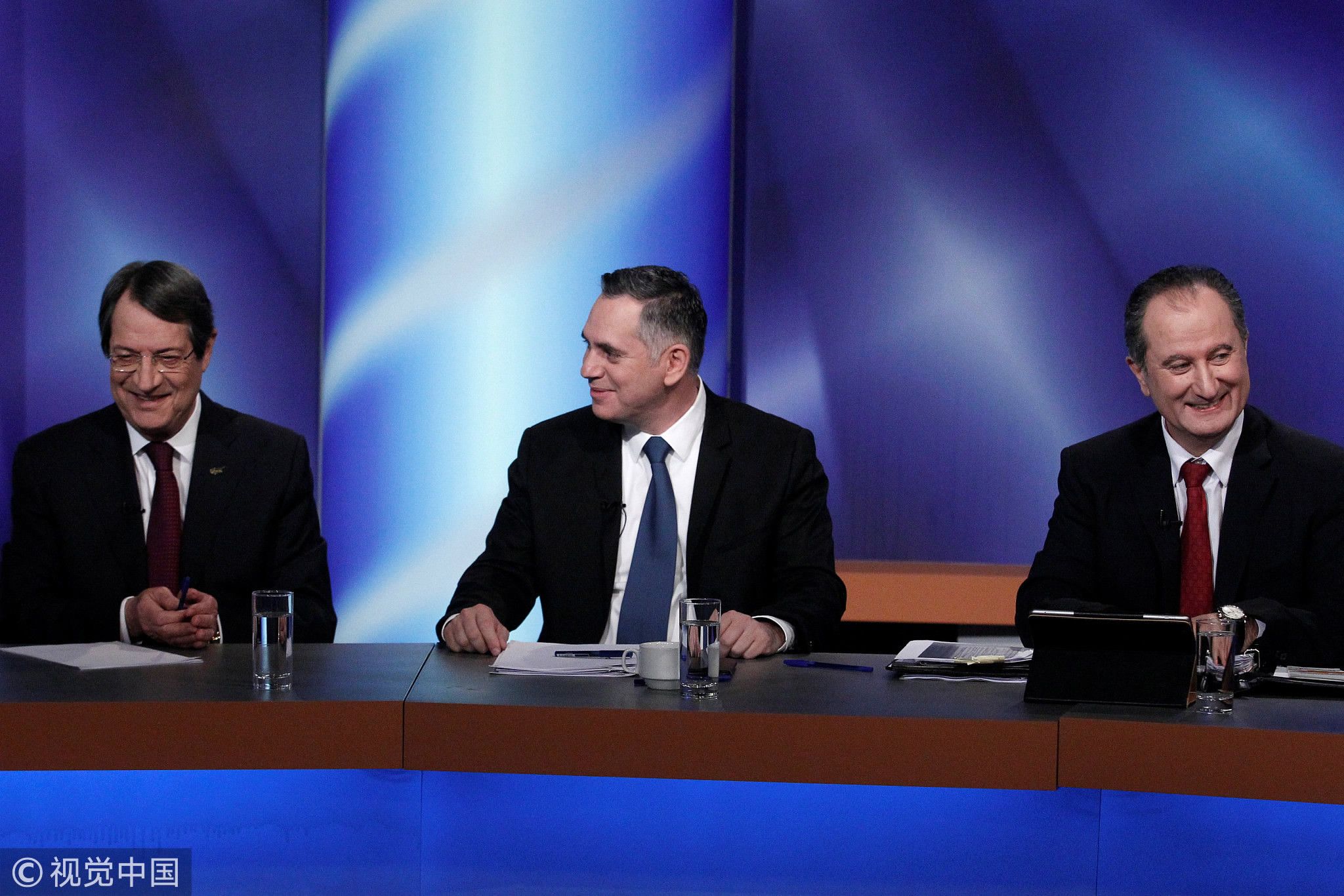
Cyprus Presidential candidate Nicos Anastasiades (L) of the right-wing Democratic Rally party, Nikolas Papadopoulos (C) leader of the center-right DIKO party, Stavros Malas (R), an independent candidate of left-wing AKEL party talk while waiting for a televised debate to go on air in Nicosia, Cyprus, January 22, 2018. /VCG Photo
Cyprus Presidential candidate Nicos Anastasiades (L) of the right-wing Democratic Rally party, Nikolas Papadopoulos (C) leader of the center-right DIKO party, Stavros Malas (R), an independent candidate of left-wing AKEL party talk while waiting for a televised debate to go on air in Nicosia, Cyprus, January 22, 2018. /VCG Photo
Nicos Anastasiades: The incumbent president has won credit for leading the country towards recovery after the eurozone debt crisis, with growth now outpacing that of the eurozone. He hopes to make the popular tourist destination a hub for exporting natural gas. The 71-year-old has been criticized for his role in failed reunification talks in 2017 but has pledged to restart negotiations from the point at which they ended.
Stavros Malas: The former health minister was defeated by Anastasiades in the 2013 election. The 50-year-old has said he would meet Akinci soon after the election to discuss a reunification deal. The Progressive Party which backs Malas was in power during the financial meltdown, and he has struggled to shake off the blame. The leftist candidate argues that Anastasiades’ acceptance of a tough EU rescue program has hurt workers and the middle class.
Nicolas Papadopoulos: The son of former president Tassos Papadopoulos has called for a new approach in negotiations over reunification and accused Anastasiades of “dangerous concessions.” The 44-year-old opposed the deal discussed in 2017 and has said he would seek talks with the UN if elected. He has also pledged to create an agency to manage non-performing loans, typically mortgages people cannot afford to pay.
What do the polls say?
The final polls released before the election indicate that Anastasiades is set for victory in the first round.
A poll by state-run Cyprus Broadcasting Corporation (CBC) puts Anastasiades on 42 percent, a comfortable lead over Malas (25 percent) but below the 50 percent threshold to win without a run-off.
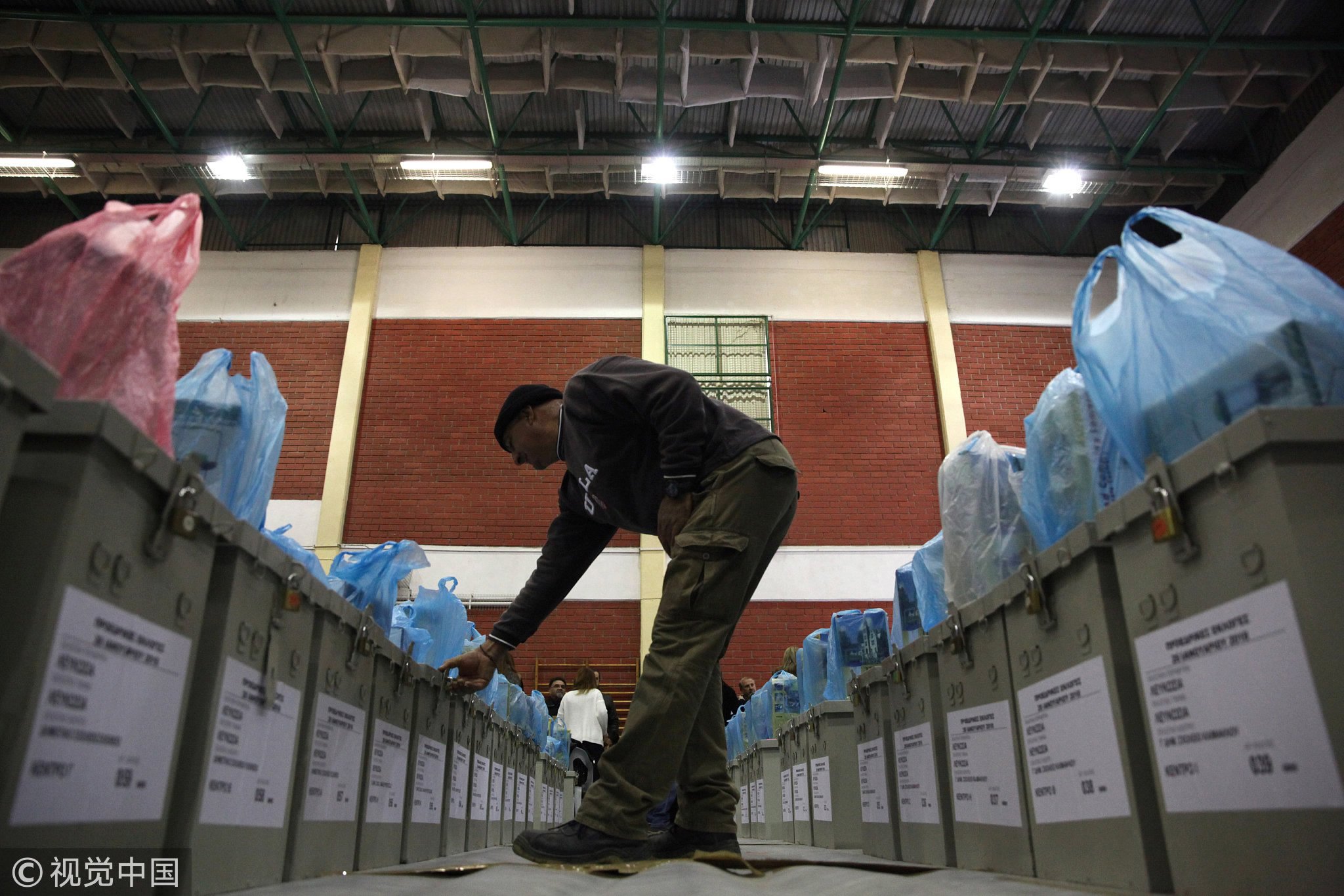
A man is seen next to ballot boxes which will be distributed to civil servants two days ahead of the presidential elections in Nicosia, Cyprus, January 26, 2018. /VCG Photo
A man is seen next to ballot boxes which will be distributed to civil servants two days ahead of the presidential elections in Nicosia, Cyprus, January 26, 2018. /VCG Photo
The tighter battle looks set to be for second place, with Malas just three points ahead of Papadopoulos.
The CBC poll suggests Anastasiades would beat Malas in a run-off with 65 percent, and would triumph over Papadopoulos with 60 percent.

